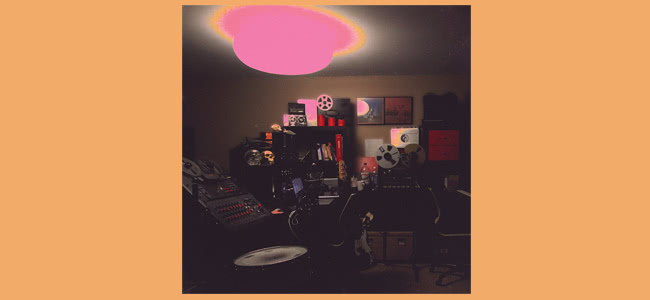Ruban Nielson has come a long way since uploading a catchy guitar-driven song to Bandcamp in 2010.
The New Zealand-born singer, guitarist, and songwriter released ‘Ffunny Ffrends’ under the shroud of online anonymity before eventually revealing himself as Unknown Mortal Orchestra and releasing a self-titled debut that followed in much of the same vein as the first song.
Two years later on II, Nielson developed his music into the complex, distorted guitar psychedelia that he’s now known for. The Unknown Mortal Orchestra niche had been found, their sound had been pretty much perfected.
But on Multi-Love, Nielsen immediately veers away from this comfy niche and towards the more experimental and adventurous world of synthesizers and electronica. And it works brilliantly.
Unknown Mortal Orchestra’s third studio album is a complicated, addictive, and at times difficult experiment that proves to be ultimately successful and rewarding. Nielson steps away from his intricate guitar lines towards layers of synth and distorted noise, while still maintaining his hook-heavy vocals and simple yet thought-provoking lyrics.
The first song released off it, which was also the title track, clearly signalled that the band had discovered a new sound. But it didn’t signpost just how wonderfully weird the forthcoming album would be. ‘Multi-Love’ is an infectiously catchy and enjoyable pop song, built up from a simple synth line. Through the song, an unknown entity toys with Nielson’s emotions: “Checked into my heart and trashed it like a hotel room”. Before he ultimately admits that “it’s not that this song’s about her, all the songs are about her”.
Practically every other song on the album boasts at least one musical element that just shouldn’t belong there, but Nielson’s immense talents somehow makes it all work nearly every time. There’s the outrageous saxophone solo on ‘Extreme Wealth and Casual Cruelty’, the “la la la” chorus on ‘Like Acid Rain’ and the return of the catchy horns section on ‘Necessary Evil’. They’re intriguing elements that help to transform many of the songs, creating a brilliant evolution of Unknown Mortal Orchestra’s sound.
II’s lyrical content focused extensively on Nielson’s loneliness and isolation while on tour. The album was a product of Nielsen and the band burning themselves out, and him genuinely fearing for his life. While its predecessor focused on life in isolation, Multi-Love moulds a narrative out of the difficulties of being together and interacting with loved ones. ‘The World is Crowded’ takes this quite literally, while ‘Can’t Keep Checking My Phone’ details the conflict between online connectivity and real-world interactions.
The song utilises the aurora borealis as a metaphor for a lack of substance in online interactions. For all you hear about it, read about it, and see it in pictures, nothing can truly compare to actually experiencing it in real life. It’s a telling example of the young songwriter’s ability to convey complex and interesting ideas through rather simple words. The track is also one of the oddest and most enjoyable moments on the album. It’s strange that an Unknown Mortal Orchestra song contains plucked acoustic guitar, heavy beats and jangly hand claps all competing for the spotlight, but it’s even stranger that it all works perfectly.
There’s no real ‘Ffunny Frends’ or ‘So Good at Being in Trouble’ on the album. There’s no instant standout or accessible “hit” to be found, but it’s probably Unknown Mortal Orchestra’s best album as a complete whole. It needs to be listened to for its full 40+ minutes, and it needs to be listened to numerous times to be fully appreciated. It takes a bit of effort, but there are many rewards to find.
Multi-Love is still catchy as hell in parts as well. Most of the nine songs are entirely addictive, none more so than ‘Necessary Evil’, which kind of feels like an old Unknown Mortal Orchestra song until those horns reappear in the chorus.
It’s a sign of a truly great artist when they continue to develop and experiment with their sounds and songwriting despite having already found success. Multi-Love is the product of an immensely talented artist exploring new avenues of expression and instrumentality while constantly pushing his own boundaries. Ruban Nielson threw the Unknown Mortal Orchestra blueprint away and it worked fantastically.
Album-closer ‘Puzzles’ is very aptly named. The sprawling seven minute epic features an array of musical jigsaw pieces that Nielsen expertly arranges into a cohesive whole. Beginning with samples of glass smashing, it gradually grows and develops into a swirling mass of noise. Electric guitar riffs emerge throughout, but they’re eventually replaced by quiet and restrained acoustic guitar which brings Multi-Love to a close, and the listener is finally given a chance to digest what they’ve heard.
Multi-Love is a testament to how good of a musician Ruban Nielson is, and his unbridled willingness to risk experimentation. It showcases his ability to adapt and hone his own sounds, while also constantly introducing new ones to the mix. It’s a whirlwind and entirely strange adventure that leaves you breathless and exhilarated. Who knows what musical realm Nielson will explore next, but we’ll be waiting with baited breath to be guided through it by him.
Multi-Love is out this Friday the 22nd May pre-order here.



































